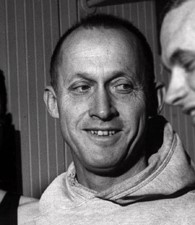A legendary track coach at the University of Oregon, Bill Bowerman coached 33 Olympians, including the talented Steve Prefontaine. He also designed lightweight running shoes and co-founded Nike.
Early Days
William Jay Bowerman Jr. was born February 19, 1911, in Portland, Oregon. His father was a president of the Oregon Senate, and his mother was a teacher. After his parents divorced, the future runner and coach lived with his mother in Fossil, Oregon, a town that his ancestors founded.
A “rebellious” child, Bowerman had a change of heart after being admonished by his high school’s superintendent for getting into fights. He began excelling at athletics and academics and went on to the University of Oregon, graduating in 1934. In college, Bowerman played on the football team and ran track; he was “taught how to run” by Bill Hayward, the school’s track coach.
Sources in this Story
- Oregon Public Broadcasting: Oregon Experience: Bill Bowerman
- Google Book Search: “Bowerman and the Men of Oregon” by Kenny Moore
- National Distance Running Hall of Fame: Bill Bowerman
- findingDulcinea: What’s Next for Nike?
- Nikebiz: Company Overview
- The New York Times: Bill Bowerman, 88, Nike Co-Founder, Dies
Notable Accomplishments
Bowerman had wanted to be a doctor, but couldn’t afford to pay for medical school. Instead, he started his career as a running coach; first at Portland’s Franklin High School, then at his alma mater, Medford High School. After a tour of duty in Italy during World War II, Bowerman returned a hero and was recruited to replace Hayward at the University of Oregon upon the elder coach’s retirement.
Bowerman pioneered a training method now used by the majority of running coaches: instead of pushing athletes day after day, Bowerman allowed for “easy” and “hard” workout days and focused on each person’s specific needs and goals. Author Kenny Moore adds in his book “Bowerman and the Men of Oregon” that Bowerman’s approach was like that of a “physical scientist,” and that he constantly evolved his strategies.
Through this method, which also pioneered the use of film to analyze performance, Bowerman “developed and guided 24 NCAA individual champions, won four national team titles and coached the U.S. track and field team in the 1972 Olympic Games,” according to his biography at the National Distance Running Hall of Fame, to which Bowerman was inducted in 2002.
Bowerman wanted to create lighter apparel and shoes for his runners, and went to a local shoemaker for guidance. Bowerman created the first lightweight outsole shoe from some latex, leather, glue and his wife’s waffle iron, and Nike, first known as Blue Ribbon Sports, was born. It was a joint venture between Bowerman and the Oregon half-miler Phil Knight, who tested some of Bowerman’s earliest pairs, and remains the chairman and CEO of Nike today.
Bowerman’s innovations indelibly altered the future of running shoes. “From 1917, when Keds, the first popularly marketed sneaker, was introduced, until the 1960’s, sports footwear underwent little change,” The New York Times obituary of Bowerman notes.
In addition, Bowerman’s book “Jogging,” published in 1967, helped spur a running boom in the United States.
The Man and His Work
- “Bill Bowerman’s High-Performance Training for Track and Field (Third Edition)” by Bill Bowerman, Bill Freeman
- “Bowerman and the Men of Oregon: The Story of Oregon’s Legendary Coach and Nike’s Cofounder” by Kenny Moore
- “Out of Nowhere: The Inside Story of How Nike Marketed the Culture of Running” by Geoff Hollister
The Rest of the Story
At the 1972 Olympic Games in Munich, Steve Prefontaine finished a disappointing fourth place in the 5000 meters. After the Games, Bowerman “continued to coach Olympic athletes, and he and Barbara were active in philanthropy, providing grants to athletic programs, schools and the arts,” according to the OPB documentary. He served on the board of Nike from 1968 until the summer of 1999. He was nominated for induction into the National Track & Field Hall of Fame in 1981, but refused because his coach, Bill Hayward, had never been inducted. Bowerman spent the final chapter of his life in a retirement community in Fossil, and died on December 24, 1999.
“Victory is having done your best,” Bill Bowerman often said. “If you’ve done your best, you’ve won.”
This article was originally written by Liz Colville; it was updated January 5, 2017.











